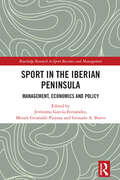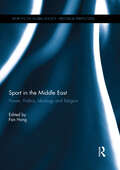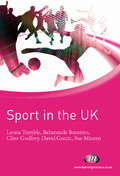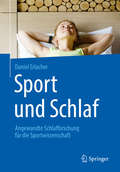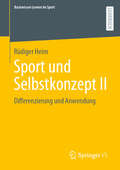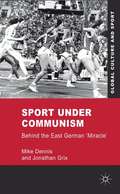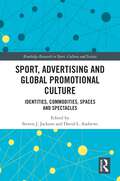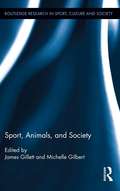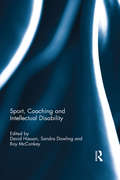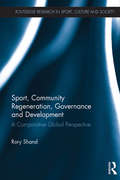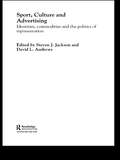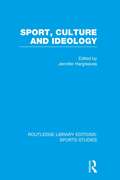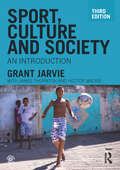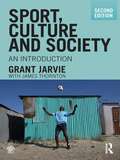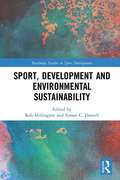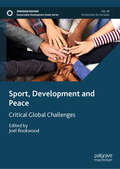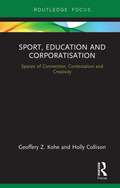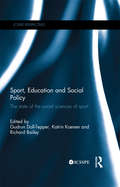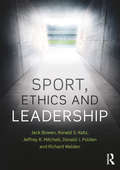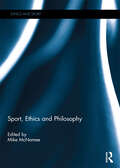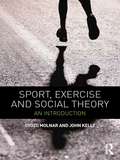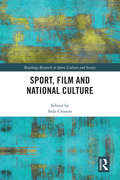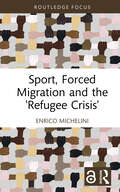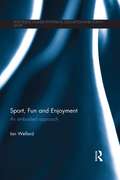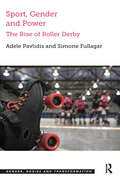- Table View
- List View
Sport in the Iberian Peninsula: Management, Economics and Policy (Routledge Research in Sport Business and Management)
by Gonzalo A. Bravo Jerónimo García-Fernández Moisés Grimaldi-PuyanaThis is the first book in English to offer an overview of the development of the sport industry in Spain and Portugal, examining the social, economic, cultural, and political impact sport has had in this region and on world sport more broadly. Drawing on sources in Spanish and Portuguese, the book presents important new perspectives and empirical material not previously available to English-speaking audiences. With a strong focus on management, development, economics, governance and law, set in a broader historical and socio-cultural context, the book explains the unique characteristics of the sport industry in the Iberian Peninsula. It takes a deep dive into Spanish and Portuguese football - in many ways the centre of gravity of Iberian sport – and into sport tourism, a hugely significant component of the broader economy of the region. The book also considers important emerging themes in Iberian sport, from the development of women’s sport to the global profile of Cristiano Ronaldo and Rafael Nadal, and considers the wider influence of Iberian sport across the wider Hispanic diaspora. This is fascinating and illuminating reading for anybody with an interest in sport business and management, global sporting cultures, international business, or Hispanic or Latin American studies.
Sport in the Middle East: Power, Politics, Ideology and Religion (Sport in the Global Society - Historical Perspectives)
by Fan HongThis collection provides interdisciplinary study of sport in the Middle East in the context of history, politics, policies, gender, religion, ideology and international relations. The chapters examine the role of the Pan-Arab Games in strengthening the bonds of Arab identity in Qatar, the contribution of sport to the building of nationhood and cultural image in Lebanon and Turkey, female involvement in the Olympic movement in Middle Eastern countries, how sport has facilitated the promotion of gender equality and how sport has served the social and cultural transformation of the Islamic world.Study of the role and functions of sport in the Middle East in its historical, political and cultural context is long overdue. Based on recent research conducted by prominent young scholars in this field, this collection will inspire and stimulate the future development of research in the Islamic world. This book was originally published as a special issue of The International Journal of the History of Sport.
Sport in the UK (Active Learning in Sport Series)
by Leona Trimble Clint Godfrey David Grecic Woobae Lee Susan MintenThis is a comprehensive introduction for HE students to the provision, organisation, and governance of sport in the UK. Supported by case study material, it introduces the reader to key government policies, and to the ways in which public, private and voluntary sectors provide sporting opportunities. The book focuses on issues of participation, employment, media coverage and commercialisation, and critically examines them in light of the key themes of equality and diversity. Pedagogical features – learning outcomes and learning activities – help students develop an active approach to the study of sport in the UK.
Sport und Schlaf: Angewandte Schlafforschung für die Sportwissenschaft
by Daniel ErlacherSport und Schlaf scheinen auf den ersten Blick zwei Themen, die unterschiedlicher kaum sein können: Körperliche sowie mentale Höchstleistungen auf der einen Seite – Inaktivität und Bewusstlosigkeit auf der anderen. Dieses Buch widmet sich diesem neuen Sachverhalt und zeigt anhand unterschiedlicher Beispiele aus der Sportpraxis, dass es hier zahlreiche Anknüpfungspunkte gibt. Ein theoretischer Teil führt zu Beginn in die Grundlagen der Sportwissenschaft und Schlafforschung ein, der weitaus größere Teil widmet sich der Anwendung im sportlichen Umfeld. Unter anderem wird das Schlafverhalten von Athletinnen und Athleten vorgestellt, wie sich Jet Lag im Sport und Schlafdeprivation vor sportlichen Leistungen als auch vor Wettkämpfen bemerkbar machen kann. Ebenso werden das Traumerleben von motorischen Handlungen sowie das Training im Klartraum behandelt. Das Buch richtet sich an Interessierte aus der Sportwissenschaft, Schlafmedizin, Psychologie, Neurologie, aber auch an Trainer und Trainerinnen, sowie an sporttreibenden Personen, die sich hier fundierter einlesen möchten.
Sport und Selbstkonzept II: Differenzierung und Anwendung (Basiswissen Lernen im Sport)
by Rüdiger HeimSeit langem wird dem Sport eine förderliche Wirkung auf das Selbstkonzept, insbesondere im Kindes- und Jugendalter, zugeschrieben. Allerdings sind die entsprechenden wissenschaftlichen Befunde mittlerweile weit verzweigt und unübersichtlich. Dieses Lehrbuch gibt einen kompakten Überblick über die sportbezogene Selbstkonzeptforschung und ihre theoretischen wie empirischen Erträge. Im Mittelpunkt dieses zweiten Bandes steht die Darstellung der charakteristischen Mechanismen der Selbstkonzeptentwicklung und der differenzierten Zusammenhänge mit dem Sportengagement, um empirisch und schulpädagogisch gestützte Schlussfolgerungen für den Sportunterricht zu empfehlen.
Sport under Communism
by Mike Dennis Jonathan GrixBased on original Stasi and Communist Party archival sources, this book uncovers why East Germany was for two decades running one of the most successful nations in the Summer and Winter Olympics, exploring how the central elite sports system was beset by internal tensions and disputes.
Sport, Advertising and Global Promotional Culture: Identities, Commodities, Spaces and Spectacles (Routledge Research in Sport, Culture and Society)
by David L. Andrews Steven J. JacksonThis book explores the intersection of contemporary sport, advertising, promotional culture and wider society.Arguing that advertising and promotional culture remain key driving forces in relation to social structures and systems that contribute to enduring patterns of economic and other forms of inequality, this book examines how sport and related areas of social life continue to be transformed by these forces. Presenting in‑depth international case studies covering topics such as Nike’s sign economies, the sports‑gambling‑media complex, sportswashing/greenwashing, radical politics in sport advertising, sport and corporate nationalism, and girls’ empowerment and transgender exclusion in sports, this book sheds critical new light on some of the most important themes in the study of global consumer culture in the emerging era of surveillance capitalism. Overall, this book examines sport advertising through the lens of the circuit of cultural commodification – including production, representation, consumption and regulation – in order to provide insights into the formation, complexities and contradictions of social identities, commodities and brands.This is fascinating reading for anybody with an interest in the sociology, culture and politics of sport, or cultural studies, media studies, and the wider politics and social significance of late‑stage capitalism.
Sport, Animals, and Society (Routledge Research in Sport, Culture and Society #31)
by James Gillett Michelle GilbertThis book advances current literature on the role and place of animals in sport and society. It explores different forms of sporting spaces, examines how figures of animals have been used to racialize the human athlete, and encourages the reader to think critically about animal ethics, animals in space, time and place, and the human-animal relationship. The chapters highlight persistent dichotomies in the use of and collaboration with animals for sport, and present strategies for moving forward in the study of interspecies relations.
Sport, Coaching and Intellectual Disability
by David Hassan Sandra Dowling Roy McConkeyThere are more opportunities than ever before for young people with disabilities to participate in sport and adapted physical education. For example, there are more than 3.7 million athletes worldwide aligned to the Special Olympics organisation, with national associations active in more than 200 countries worldwide. Despite this rapid growth, all too often coaches and teachers lack adequate knowledge of the particular challenges faced by people with intellectual disabilities. The principal aim of this book is to improve the understanding and professional skills of coaches, teachers, practitioners and researchers, to promote awareness of successful programmes addressing the needs of such young people, and to challenge the prevailing myths and stereotypes surrounding their abilities. With contributions from leading researchers and practitioners around the world, this book is the first to explore in depth the topic of sport and intellectual disability from a coaching perspective. Including both theoretical discussion and empirical case-studies, the book covers a full range of contemporary issues and themes, including training and coaching, family support, perceptions of disability, athlete motivation, positive sport experiences, motor development programmes, and social and cultural aspects of disability. Sport Coaching and Intellectual Disability is important reading for any student, researcher, coach, teacher, manager or policy maker with an interest in disability sport, physical education, coaching, or mainstream disability studies.
Sport, Community Regeneration, Governance and Development: A comparative global perspective (Routledge Research in Sport, Culture and Society)
by Rory ShandSporting mega events are playing an increasingly important role in the governance of community regeneration and development across the globe. This book examines the ways in which sporting organisations engage with local communities through projects that target youth, health or social issues and act as key partners in governance mechanisms. Showcasing original research to suggest that sporting organisations, mega events and legacies are now operating as governing instruments in renewal programmes, it sheds new light on the role that sport plays in community regeneration and development on an international scale. Drawing on the interpretivist approach to governance which bridges theory and practice, the book considers how relationships between sporting mega events, legacies and local communities are evolving to foster trust and encourage participation. With international case studies from the UK, Brazil and South Africa, it reflects on best practice in relation to governance structure, funding mechanisms and partnerships. Sport, Community Regeneration, Governance and Development: A Comparative Global Perspective is fascinating reading for all students and scholars with an interest in governance, sport development, sport policy, sport management or the sociology of sport.
Sport, Culture and Advertising: Identities, Commodities and the Politics of Representation
by David L. Andrews Steven J. JacksonDespite the range of theoretical and methological positions adopted and the wide range of issues and topics related to advertising covered by cultural studies, relationships between sport and advertising have been largely overlooked.Given its gobal popularity and its prevalence across the spectrum of cultural and commercial life it is not surprising that scholars interrogating the cultural politics of sport have begun to recognise advertising as an important site for the analysis of power relations, cultural politics and cultural repesentation. Sport, Culture and Advertising presents a first step towards understanding the relationship between advertising and identity with a focus on sport. The book will be useful for scholars across a range of disciplines and will be of interest to students looking for a more critical examination of the commercial realm of sport.
Sport, Culture and Ideology (Routledge Library Editions: Sports Studies)
by Jennifer HargreavesSport celebrates basic human values of freedom, justice and courage. This collection of essays probes beneath those assumptions in order to illuminate how sport is intimately related to power and domination. Topics include the media treatment of sport, drug-taking in sport and the controversial and problematic relationship between sport and politics in Russia and South Africa.
Sport, Culture and Society: An Introduction
by Grant JarvieWhat can sport do to produce social change in our world today? It is impossible to fully understand contemporary society and culture without acknowledging the importance of sport. Sport is part of our social and cultural fabric, possessing a commercial power that makes it a potent force in the world, for good and for bad. It has helped to start wars and promote international reconciliation, and governments around the world commit public resources to sport. Sport matters, but how should you make sense of what is going on in the world of sport today? Now in a fully revised, updated and expanded third edition, this critical, challenging and comprehensive textbook introduces the study of sport, culture and society. International in scope, it challenges us to reactivate an audacious spirit of activism through sport. Full of contemporary examples, it places sport at the heart of the analysis and introduces the reader to every core topic and emerging area in the study of sport and society, including: the history and politics of sport; sport, gender and sexuality; sport, disability and advocacy; sport, race and racism; sport, violence and crime; sport and health; sport, globalisation and democracy; sport, media and cultural relations; sport and the environment; sporting cities and mega-events; sport, poverty and development. Each chapter includes a wealth of useful features, including Sport in Focus case studies, chapter summaries, guides to further reading, revision questions, practical projects, definitions of key concepts and weblinks. Additional teaching and learning resources – including a testbank, resource list and glossary – are available on a companion website. Sport, Culture and Society is the most broad-ranging, in-depth and thoughtful introduction to the sociocultural analysis of sport currently available and sets a new agenda for the discipline. It is essential reading for all students with an interest in sport.
Sport, Culture and Society: An Introduction, second edition
by Grant JarvieIt is impossible to fully understand contemporary society and culture without acknowledging the place of sport. Sport is part of our social and cultural fabric, possessing a social and commercial power that makes it a potent force in the world, for good and for bad. Sport has helped to start wars and promote international reconciliation, while every government around the world commits public resources to sport because of its perceived benefits. From the bleachers to the boardroom, sport matters. Now available in a fully revised and updated new edition, this exciting, comprehensive and accessible textbook introduces the study of sport, culture and society. International in scope, the book explores the key social theories that shape our understanding of sport as a social phenomenon and critically examines many of the assumptions that underpin that understanding. Placing sport at the very heart of the analysis, and including vibrant sporting examples throughout, the book introduces the student to every core topic and emerging area in the study of sport and society, including: the history and politics of sport sport and globalization sport and the media sport, violence and crime sport, the body and health sport and the environment alternative sports and lifestyles sporting mega-events sport and development. Each chapter includes a wealth of useful features to assist the student, including chapter summaries, highlighted definitions of key terms, practical projects, revision questions, boxed case-studies and biographies, and guides to further reading, with additional teaching and learning resources available on a companion website. Sport, Culture and Society is the most broad-ranging and thoughtful introduction to the socio-cultural analysis of sport currently available and sets a new agenda for the discipline. It is essential reading for all students with an interest in sport. Visit the companion website at www. routledge. com/cw/jarvie.
Sport, Development and Environmental Sustainability (Routledge Studies in Sport Development)
by Simon C. Darnell Rob MillingtonThis is the first book to consider the intersections of sport, international development and environmental sustainability. It explores the tensions between sport’s potential contribution to the environment and its rather poor record to date. Bringing together a diverse group of scholars who approach the topic from various disciplinary and theoretical perspectives, the book provides both critical and optimistic perspectives on the place of sport in sustainable development. Chapters examine and question how and whether sport contributes to sustainable development on an international scale. Attention is also paid to the place and role of Indigenous knowledge in sustainable Sport for Development, particularly as an alternative to modernization and/or in support of reconciliation with Indigenous peoples. Sport, Development and Environmental Sustainability is important reading for academic researchers, students and policy-makers in the fields of kinesiology, sport studies, sport sociology, leisure studies, sport management, sport media, physical cultural studies, environmental studies and sustainability and international development studies.
Sport, Development and Peace: Critical Global Challenges (Sustainable Development Goals Series)
by Joel RookwoodThis volume offers a comprehensive exploration of the rapidly evolving landscape of Sport for Development and Peace (SDP), a critical approach to peacebuilding, economic development, and social transformation gaining increasing stature during the last twenty-five years. Contributors here scrutinize the diversification in SDP methods and ideals, spotlighting global dimensions and differences in this burgeoning field. Encompassing contributions from scholars across five continents, the chapters illuminate diverse approaches and analyses, reflecting a variety of viewpoints and experiences. The volume highlights the heterogeneity within SDP and assesses the trajectory of SDP studies, while also identifying common threads among seemingly disparate approaches. Further, it investigates sport's role in responding to global challenges, from financial crises to the COVID-19 pandemic, climate change, and conflicts, and although sport is often recognized for its potential to foster peace and development, this book navigates the intricate complexities and contradictions that can arise in the practice of harnessing sport for these goals. With 14 engaging chapters, the book delves into a range of topics, including critical analyses of different SDP approaches, the sustainability of sport initiatives, alignment of SDP with sustainable development goals, and the use of sport in refugee resettlement. It also examines sport's contribution to societal outcomes like health, education, inequality reduction, and peace, while discussing challenges faced in the field. Moreover, the volume explores the connections between SDP and indigenous philosophies, feminism, local community development, and issues of violence within prisons. Offering a holistic view of SDP's evolution and impact, presenting fresh perspectives as well as critical insights for scholars, practitioners, and policymakers in the realm of international sport, development, and peacebuilding, this volume marks itself an essential resource for understanding the multifaceted landscape of SDP.
Sport, Education and Corporatisation: Spaces of Connection, Contestation and Creativity (Routledge Focus on Sport, Culture and Society)
by Holly Collison Geoffery Z. KoheUsing an interdisciplinary approach, Sport, Education and Corporatisation offers an important critique of the intersection between sport organisations, commercial agendas and educational development. It reveals a discomforting interplay between sector stakeholders that has been normalised via discourses of civic ‘good’, social responsibility and community welfare. The book employs stakeholder theory, corporate social responsibility ideals, and holistic constructions of space to provide a framework to understand some of the latent and explicit complexities of sport sector connectivity. Interrogating the key contexts, issues and challenges that emerge from the Sport-Education-Corporate nexus and drawing upon evidence from international, national and local sport organisations, it argues for sustained and rigorous examination of the commercialisation of educational agendas and new directions for education-based corporate social responsibility within the sport industry. This is an invaluable resource for researchers working in the areas of sport management; sport development; sociology of sport; sport policy and politics; physical education; and the wider economics, organisational politics and business ethics fields. It is also a fascinating read for students within sport business management, sports studies, sport politics and physical education programmes.
Sport, Education and Social Policy: The state of the social sciences of sport (ICSSPE Perspectives)
by Richard Bailey Gudrun Doll-Tepper Katrin KoenenThis important study brings together world-leading researchers to reflect upon the state of the social scientific study of sport. Addressing three core themes in sport studies – equality, education and policy – the book looks back over the development of sport research in recent decades and offers new insights into future lines of enquiry. Presenting a unique collection of authoritative perspectives from some of the best-known scholars in the social scientific study of sport, the book engages with key contemporary issues such as gender stereotypes in physical education, ethnicity, inclusion and critical race theory, physical literacy, physical activity and health, and international sport governance. Its chapters address major topics such as the globalisation of physical activity initiatives and the involvement of the EU in developing sport policies, as well as shedding light on new areas of research such as the growing participation of Muslim women in sport. Sport, Education and Social Policy: The state of the social sciences of sport is fascinating reading for any researcher or advanced student working in sport studies, physical education or kinesiology.
Sport, Ethics and Leadership
by Jack Bowen Donald J. Polden Jeffrey R. Mitchell Richard Walden Ronald S. KatzEverybody involved in sport, from the bleachers to the boardroom, should develop an understanding of ethics. Sport ethics prompt discussion of the central principles and ideals by which we all live our lives, and effective leadership in sport is invariably ethical leadership. This fascinating new introduction to sport ethics outlines key ethical theories in the context of sport as well as the fundamentals of moral reasoning. It explores all the central ethical issues in contemporary sport: from violence, hazing, and gambling to performance enhancement, doping, and discrimination. This book not only investigates the ethical, social, and legal underpinnings of the most important issues in sport today, but also introduces the reader to the foundations of ethical leadership in sport and discusses which leadership strategies are most effective. Each chapter includes original real-world case studies, learning exercises, and questions to encourage students to reflect on the ethical problems presented. Sport, Ethics and Leadership is an essential resource for any course on sport and leisure studies, the ethics and philosophy of sport, or sport and leisure management.
Sport, Ethics and Philosophy (Ethics and Sport)
by Mike McNameeThis book represents a bold statement concerning the excitement and energy of the field of sports ethics and philosophy in contemporary terms. It is comprised of a collection of commissioned essays from the leading international scholars in the field to celebrate the ten year editorship of Mike McNamee for the journal: Sport, Ethics and Philosophy. The collection includes essays familiar sport philosophers on work about the nature and nuances of sports and games playing, winning and losing, role models and strategic fouling. It also celebrates in phenomenological terms the complex and heterogeneous experience and values of sports in both phenomenological and analytic modes. Finally, it addresses the most serious threats to sport integrity and governance, in the shape of doping, and the unchecked power of sports institutions, and the charisma of sport that is at the mercy of commercialism. This book was originally published as a special issue of Sport, Ethics and Philosophy.
Sport, Exercise and Social Theory: An Introduction
by John Kelly Gyozo MolnarWhy are sport and exercise important? What can the study of sport and exercise tell us about wider society? Who holds the power in creating contemporary sport and exercise discourses? It is impossible to properly understand the role that sport and exercise play in contemporary society without knowing a little social theory. It is social theory that provides the vocabulary for our study of society, that helps us ask the right critical questions and that encourages us to look for the (real) story behind sport and exercise. Sport, Exercise and Social Theory is a concise and engaging introduction to the key theories that underpin the study of sport, exercise and society, including feminism, post-modernism, (Neo-)Marxism and the sociological imagination. Using vivid examples and descriptions of sport-related events and exercise practices, the book explains why social theories are important as well as how to use them, giving students the tools to navigate with confidence through any course in the sociology of sport and exercise. This book shows how theory can be used to debunk many of our traditional assumptions about sport and exercise and how they can be a useful window through which to observe wider society. Designed to be used by students who have never studied sociology before, and including a whole chapter on the practical application of social theory to their own study, it provides training in critical thinking and helps students to develop intellectual skills which will serve them throughout their professional and personal lives.
Sport, Film and National Culture (Routledge Research in Sport, Culture and Society)
by Seán CrossonSport and film have historically been key components of national cultures and societies. This is the first collection dedicated to examining the intersection of these popular cultural forces within specific national contexts. Covering films of all types, from Hollywood blockbusters to regional documentaries and newsreels, the book considers how filmic depictions of sport have configured and informed distinctive national cultures, societies and identities. Featuring case studies from 11 national contexts across 6 continents – including North and South America, Europe, Africa, Asia and Oceania – it reveals the common and contrasting approaches that have emerged within sport cinema in differing national contexts. This is fascinating and important reading for all students and researchers working in film, media, cultural studies or sport, and for broader enthusiasts of both sport and film.
Sport, Forced Migration and the 'Refugee Crisis' (Routledge Focus on Sport, Culture and Society)
by Enrico MicheliniDrawing on original research, this book looks at what sport can tell us about the social processes, patterns and outcomes of forced migration and the &‘refugee crisis&’. Adopting a systems theory framework and examining different sport disciplines, performance levels and settings, it represents a significant contribution to our understanding of one of the most urgent social issues facing the modern world. The book explores four key aspects of sport&’s intersection with forced migration. Firstly, it looks at how the media covers sport in relation to the &‘refugee crisis&’, specifically coverage of refugee elite athletes. Secondly, it examines the adaptation of sport organisations to the &‘refugee crisis&’, including the culture, programmes and structures that promote or obstruct sport for refugees. Thirdly, the book looks at sport in refugee sites, and how sport can be used as therapy, an escape or empowerment for refugees but also how it can reinforce the divisions between staff and the refugees themselves. Finally, the book looks at how forced migration influences and is influenced by participation in elite sport, by examining the biographies of elite migrant athletes. A richly descriptive, critical and illuminating piece of work, this book is fascinating reading for anybody with an interest in sport, migration, sociology or the relationship between sport and wider society.
Sport, Fun and Enjoyment: An Embodied Approach (Routledge Studies in Physical Education and Youth Sport)
by Ian WellardSport, Fun and Enjoyment explores the pleasurable aspects of sport within the context of everyday recreational and competitive physical activities. While much recent work has focused on the relationships between physical activity, health and wellbeing, much less attention has been paid to pleasure and fun, key aspects of our engagement with sport but not so easy to measure in terms of specific outcomes. By offering a critical exploration of what can be constituted as ‘fun’ in a sporting context, this book reveals the complex ways in which individuals approach sport and engage with it throughout the life course. The book considers the importance of pleasure and fun as a factor in our initial, formative experiences of sport activity, and as a factor in participation and continued participation. It explores the nature of fun as an embodied experience which incorporates a multitude of social, psychological and physiological components, and as a subjective experience which cannot be fully explained through simplistic binary formulations of pleasure and pain. Drawing on a wide research literature and original empirical research with children and adults, the book outlines a new theoretical framework for thinking about pleasure and fun in sport, highlighting the contrasting ways in which sport and physical activity is experienced and the interplay between individual and social contexts. Sport, Fun and Enjoyment is important reading for anybody with an interest in physical education, youth sport, the sociology of sport, physical activity and health, sport development or sport policy.
Sport, Gender and Power: The Rise of Roller Derby (Gender, Bodies and Transformation)
by Simone Fullagar Adele PavlidisAs a new breed of lifestyle sport enthusiasts ’derby grrrls’ are pushing the boundaries of gender as they negotiate the nexus of pleasure, pain and power relations. Offering a socio-cultural analysis of the rise and reinvention of roller derby as both a new, globalized women’s sport and an everyday creative leisure space, this book explores the manner in which roller derby has emerged as a gendered space for self-transformation, belonging and embodied contest, in which women are invited to experience their emotions differently, embrace pain and overcome limits. Sport, Gender and Power: The Rise of Roller Derby presents detailed interview, ethnographic and autoethnographic material, together with a range of media texts to shed new light on the complex relationships of power experienced by women in derby as a sport culture, whilst also examining the darker relationships that characterise the sport, including those of inclusion and exclusion, difference and identity, and competition and participation. A contemporary feminist study of empowerment, sexual difference, gender and affect, this book will appeal to scholars of gender and sexuality, embodiment, feminist thought and the sociology of sport and leisure.
